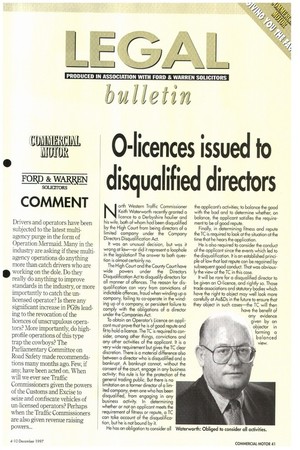0-licences issued to disqualified directors
Page 43

If you've noticed an error in this article please click here to report it so we can fix it.
North Western Traffic Commissioner Keith Waterworth recently granted a licence to a Derbyshire haulier and his wife, both of whom had been disqualified by the High Court from being directors of a limited company under the Company Directors Disqualification Act.
It was an unusual decision, but was it wrong at law—or did it represent a loophole in the legislation? The answer to both question is almost certainly no. The High Court and the County Court have wide powers under the Directors Disqualification Act to disqualify directors for all manner of offences. The reason for disqualification can vary from convictions of indictable offences, fraud when winding up a company, failing to co-operate in the winding up of a company, or persistent failure to comply with the obligations of a director under the Companies Act. To obtain an Operator's Licence an applicant must prove that he is of good repute and fit to hold a licence. The TC is required to consider, among other things, convictions and any other activities of the applicant. It is a very wide requirement but gives the TC clear discretion. There is a material difference also between a director who is disqualified and a bankrupt. A bankrupt cannot, without the consent of the court, engage in any business activity: this rule is for the protection of the general trading public. But there is no limitation on a former director of a limited company, even one who has been disqualified, from engaging in any business activity. In determining whether or not an applicant meets the requirement of fitness or repute, a TC can take account of the disqualification, but he is not bound by it. He has an obligation to consider all the applicant's activities; to balance the good with the bad and to determine whether, on balance, the applicant satisfies the requirement to be of good repute. Finally, in determining fitness and repute the TC is required to look at the situation at the time that he hears the application. He is also required to consider the conduct of the applicant since the events which led to the disqualification. It is an established principle of law that lost repute can be regained by subsequent good conduct. That was obviously the view of the TC in this case. It will be rare For a disqualified director to be given an 0-licence, and rightly so. Those trade associations and statutory bodies which have the right to object may well look more carefully at As&Ds in the future to ensure that they object in such cases—the TC will then have the benefit of any evidence given by an objector in forming a balanced view.
















































































































